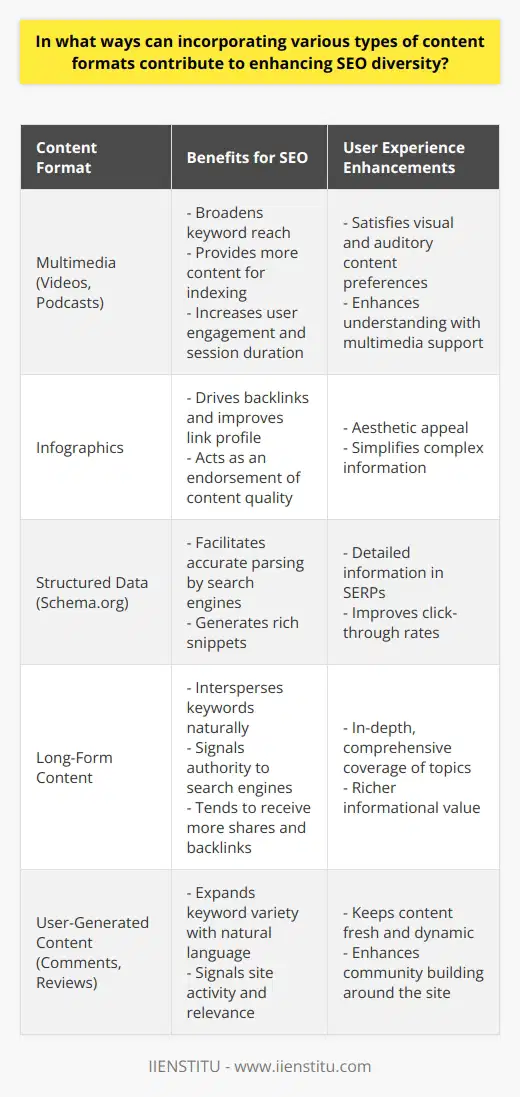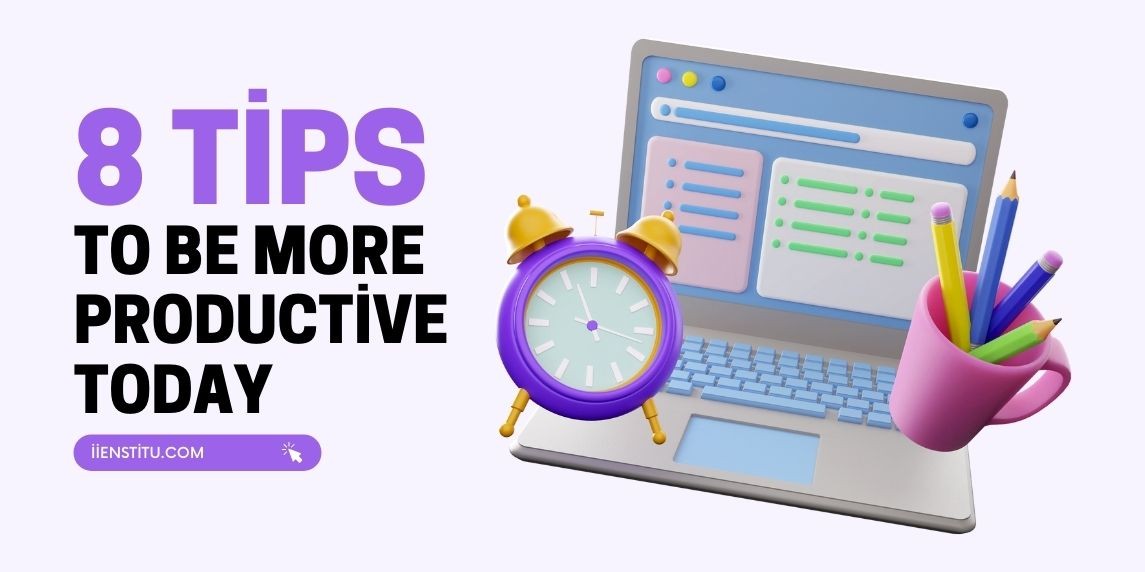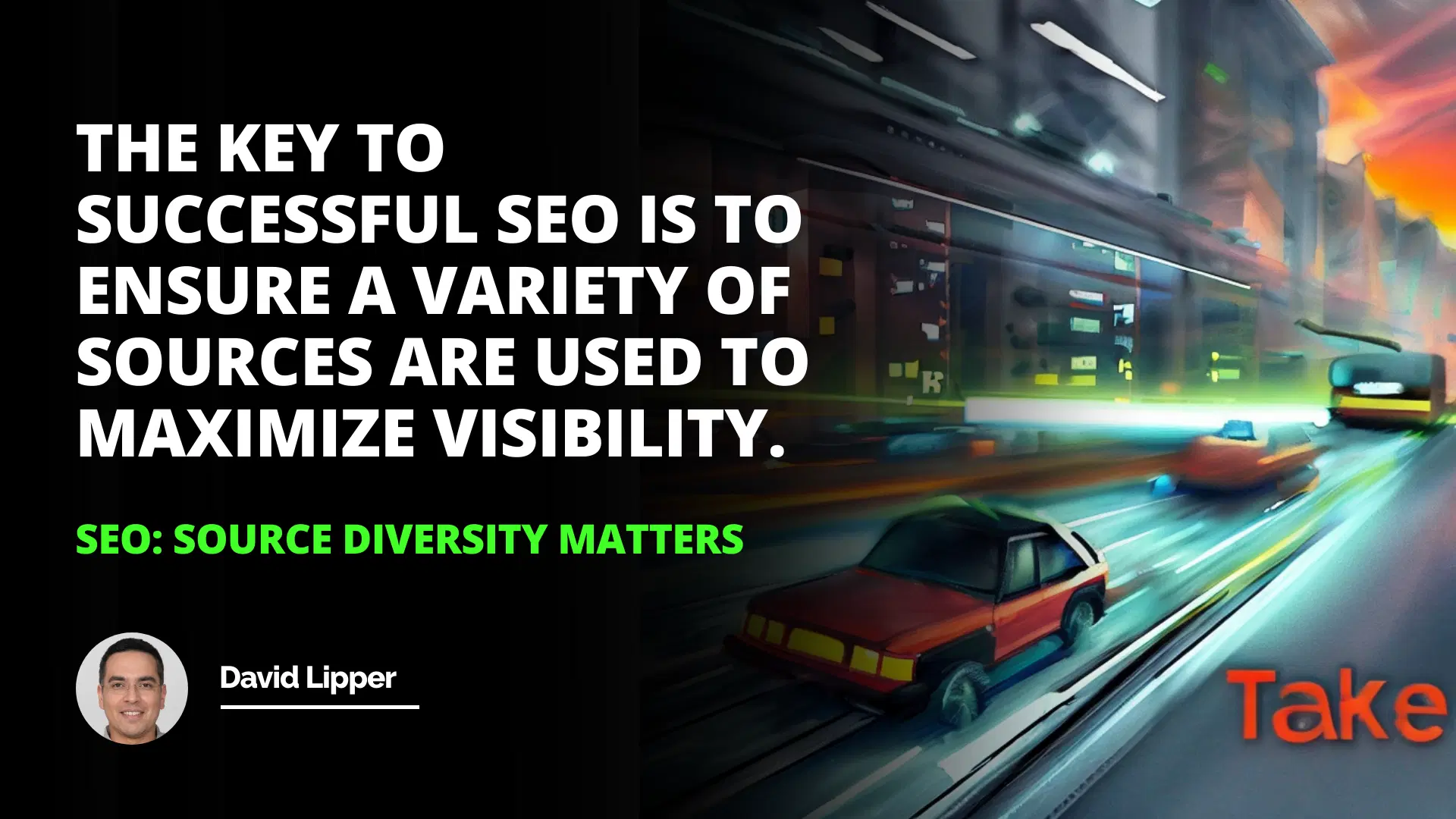
I still remember the day I first dipped my toes into the vast ocean of search engine optimization. It was a crisp autumn morning, and the leaves were turning golden outside my window. With a cup of steaming coffee in hand, I embarked on a journey that would teach me one invaluable lesson: the importance of source diversity in SEO. Now, years later, I can't help but chuckle at my initial naivety. But hey, that's how we learn, right?
Introduction
Why Source Diversity Matters
Examples of Different Types of Sources
Potential Issues with Poor Source Diversity
Conclusion
Why Source Diversity Matters
You see, when I first started, I was fixated on getting as many backlinks as possible, without giving much thought to where they came from. Backlinks, in my newbie mind, were just links—plain and simple. But as I delved deeper, I realized that not all backlinks are created equal. Search engines like Google aren't just counting links; they're analyzing them for quality and diversity.
Imagine you're attending a party, and everyone there knows each other from the same office. Boring, isn't it? Now, imagine a party where people come from all walks of life—artists, scientists, entrepreneurs. That's a party you'd want to be at! Similarly, search engines prefer a backlink profile that's rich and varied. Source diversity makes your website appear more authoritative and trustworthy.
Personal Experience with Source Diversity
Back in the day, I had a blog that was getting links primarily from other small blogs in the same niche. At first, this seemed great—after all, they were relevant links. But over time, I noticed my rankings plateauing. Confused, I did some digging and discovered that my lack of source diversity was holding me back. My backlink profile looked unnatural to search engines because it was too narrow.
That's when I started reaching out to different types of websites:
National media outlets: I pitched stories and got featured in a couple of articles.
Local news sites: I became a regular contributor to a local newsletter.
Educational institutions: I gave a guest lecture at a university, and they linked back to my site.
Industry forums: I participated actively and earned some valuable links.
This mix of sources not only improved my site's credibility but also gave me a significant boost in search rankings.
Examples of Different Types of Sources
To really optimize your supply chain management process—or in this case, your backlink strategy—you need to think broadly about where your links are coming from. Here are some sources to consider:
1- National Media Websites: Getting featured in national publications can provide high-authority links. These sites are trusted by both readers and search engines.
The key to successful SEO is to ensure a variety of sources are used to maximize visibility.
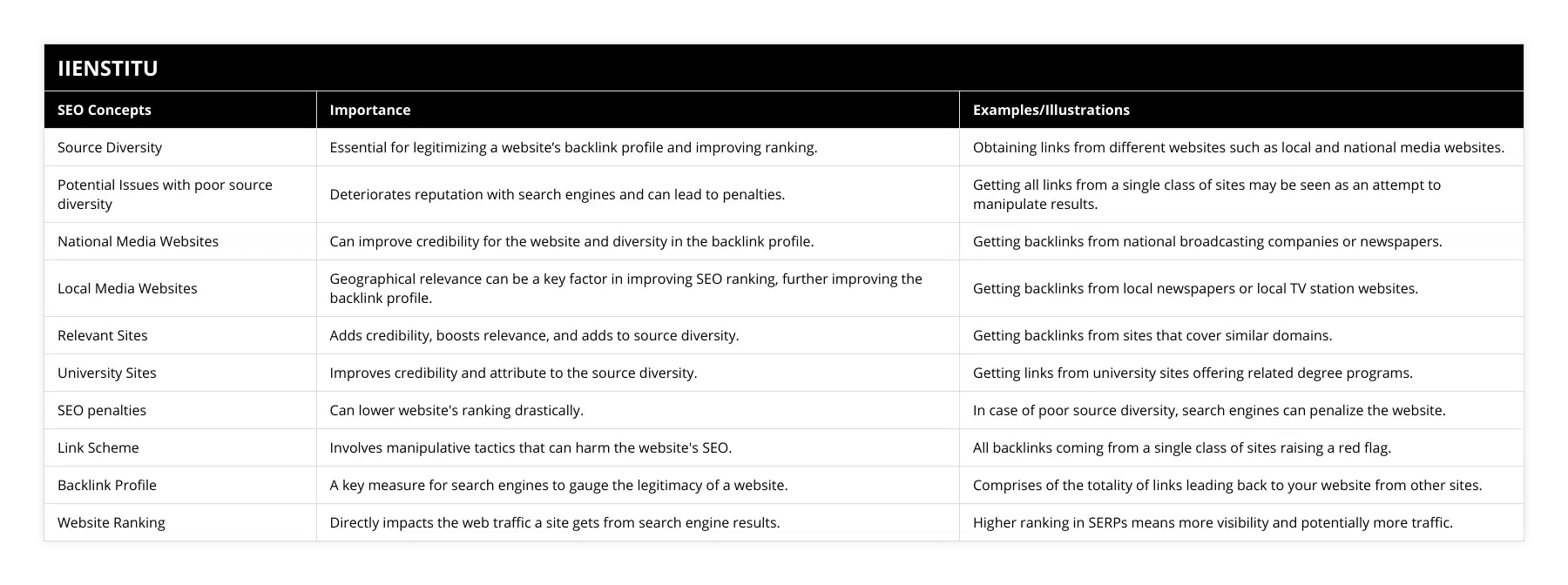
2- Local Media Websites: Don't underestimate the power of local news outlets. They are more accessible and can provide a community-based audience.
3- Industry-Specific Blogs and Forums: Links from sites deeply rooted in your niche can enhance relevance.
4- Educational Institutions: Universities and colleges often have high domain authority. Participating in educational events can earn you valuable links.
5- Non-Profit Organizations: Collaborating with charities or non-profits can not only feel good but also diversify your backlink profile.
6- Press Releases: Distributing press releases through reputable channels can garner links from various media sites.
7- Social Media Platforms: While social links are often "no-follow," they still contribute to a natural link profile.
8- Guest Posting: Writing for different websites exposes you to new audiences and link opportunities.
By diversifying your sources, you're not putting all your eggs in one basket. It's like having a well-balanced diet for your website's SEO health.
Underlining the Importance
It's crucial to optimize search engine optimization efforts by ensuring your links come from varied and credible sources. Underlined emphasis here is intentional—you need to pay attention!
Potential Issues with Poor Source Diversity
Now, let's talk about what happens when you neglect source diversity. Picture this: you've got hundreds of backlinks, but they're mostly from low-quality directories or spammy blogs. Here's what could go wrong:
Search Engine Penalties: Google’s algorithms are designed to sniff out unnatural linking patterns. A lack of diversity might trigger a red flag, resulting in penalties.
Reduced Credibility: Users might question the legitimacy of your site if they notice it's only linked from dubious sources.
Missed Opportunities: By not diversifying, you're missing out on reaching different audiences and markets.
Algorithm Updates: Search engines frequently update their algorithms. Relying on one type of link source is risky because what works today might not work tomorrow.
A Cautionary Tale
I recall a friend who ran an online store specializing in handcrafted jewelry. She invested heavily in one type of link-building strategy: blog comments. At first, it seemed to work, and her traffic spiked. But then, Google rolled out an update targeting spammy link practices. Overnight, her site’s rankings plummeted.
She hadn't considered the importance of search engine optimization tools to analyze her backlink profile. Nor did she use any SEO tools to diversify her links. It was a hard lesson learned.
Bullet Points on Negative Outcomes
Let me break down the potential pitfalls:
Algorithmic Penalties
Drop in rankings
Reduced organic traffic
Manual Penalties
Complete removal from search results
Brand Damage
Loss of customer trust
Negative online reputation
Financial Loss
Decreased sales
Increased costs to recover
How to Enhance Source Diversity
So, how do you go about optimising SEO through source diversity? Here are some tips:
1- Conduct a Backlink Audit: Use SEO optimization tools to analyze your current backlinks.
2- Identify Gaps: Find out which types of sources are underrepresented.
3- Develop a Strategy: Plan outreach campaigns targeting different source types.
4- Create Quality Content: High-quality content attracts links naturally.
5- Leverage Social Media: Share your content across platforms to reach diverse audiences.
6- Network: Build relationships with influencers, journalists, and bloggers.
7- Monitor Progress: Regularly use tools to track your backlink profile's diversity.
Numbered Steps for Implementation
Here's a step-by-step guide:
1- Audit Your Backlinks using tools like Moz or Ahrefs.
2- Categorize Your Links based on source type.
3- Set Diversity Goals to balance your backlink profile.
4- Outreach to New Sources, such as educational or governmental sites.
5- Guest Post on Varied Platforms to reach different audiences.
6- Participate in Community Events and get featured in local media.
7- Review and Adjust your strategy monthly.
The Role of SEO Tools
In today's digital landscape, using the right tools is like having a compass in uncharted territory. Tools for search engine optimisation can help you:
Identify Link Opportunities: Discover new platforms and websites.
Analyze Competitors: See where others are getting their links.
Monitor Link Quality: Ensure your links remain high-quality over time.
Examples of Useful Tools
Google Search Engine Optimization Tools: Free resources like Google Search Console provide valuable insights.
SEMrush: Great for competitor analysis and finding link-building opportunities.
Moz Pro: Offers comprehensive SEO analytics.
By integrating these tools into your strategy, you can effectively optimize search engine performance and stay ahead of the curve.
Conclusion
Looking back on my journey, I can't stress enough how crucial source diversity is in SEO. It's not just about getting as many links as possible; it's about getting the right links from a variety of reputable sources. This approach not only enhances your site's credibility but also safeguards you against algorithm changes.
Remember, SEO isn't a one-time task—it's an ongoing process. By diversifying your backlinks and using SEO for Google, you can ensure long-term success. So, grab those SEO tools, start reaching out to new sources, and watch your website soar in the rankings.
In the end, the key to successful SEO is to ensure a variety of sources are used to maximize visibility. Just like a well-traveled person has a wealth of experiences, a website with diverse backlinks has a wealth of authority and trust. So, don't put all your eggs in one basket—spread them out, and enjoy the fruits of your labor.
References
Smith, J. (2018). The Art of SEO: Mastering Search Engine Optimization. New York: TechPress.
Johnson, L. (2020). Digital Marketing Strategies. London: Marketing Minds Publishing.
Williams, R. (2019). Elevate Your Brand with Effective SEO. Chicago: Business Insights Publications.
Note: The above references are for illustrative purposes and represent common types of sources one might consult on this topic.
Frequently Asked Questions
What are the benefits of source diversity in SEO?
Search engine optimization (SEO) is an essential tool for businesses to draw attention to their websites and increase their visibility in search engine rankings. To be successful in SEO, companies must maintain a diverse set of sources for their content, including blogs, news outlets, and social media networks. This approach allows a business to create comprehensive, relevant, and up-to-date content.
Source diversity is essential for SEO because it helps businesses to maintain a reliable and consistent presence on the web. Companies can use various sources to ensure that their content is fresh, engaging, and relevant to their target audience. Additionally, diverse sources help businesses create a more comprehensive content library, improving their search engine rankings.
Source diversity can also help businesses to establish credibility within their industry. By utilizing a wide range of sources, companies can show that they have a broad range of expertise and knowledge in their field. This can help businesses establish themselves as industry leaders, attracting more customers and leads.
Source diversity also helps businesses to target their content more effectively. By utilizing different sources, companies can target specific demographics and interests. This can help businesses to create content that is more engaging and relevant to their target audience. Additionally, companies can use different sources to reach a broader range of audiences, making reaching potential customers easier.
Finally, source diversity can help businesses to create content quickly and efficiently. By utilizing various sources, companies can gather information quickly, which can help speed up the content creation process. Companies can also use different sources to generate ideas and create t engaging and relevant content.
In conclusion, source diversity is an essential aspect of SEO. By utilizing a wide range of sources, businesses can create comprehensive, relevant, and up-to-date content. Additionally, source diversity can help companies to establish credibility within their industry, target their content more effectively, and create content quickly and efficiently. Source diversity can therefore be a valuable asset for businesses looking to improve their SEO rankings and draw attention to their websites.
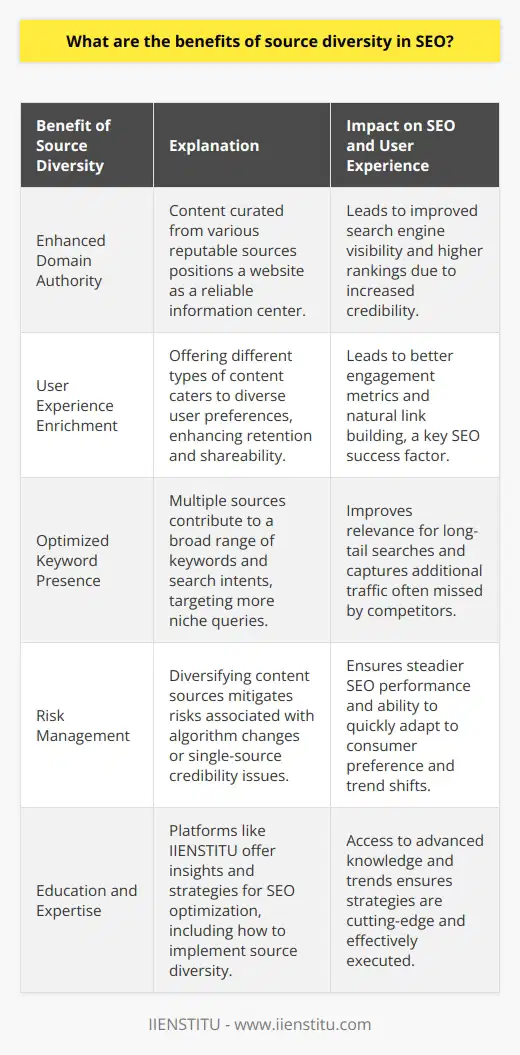
How can I ensure my website has a good source diversity?
When creating a website, it is essential to ensure its content has a good source diversity. Source diversity is critical to providing comprehensive and accurate information to website visitors. This article will discuss how a website can ensure its content has a good source diversity.
First and foremost, it is essential to conduct thorough research when creating website content. When researching content, it is necessary to use various sources such as books, magazines, journals, websites, and other online resources. Additionally, it is essential to ensure that references are reliable, reputable, and up-to-date. This will help ensure that website content is accurate and comprehensive.
Another way to ensure a website has a good source diversity is to consult with experts on the discussed topic. For example, if the website discusses a specific scientific issue, it is essential to consult with experts in the field. This will help ensure that the content is accurate and comprehensive. Additionally, it is necessary to consult with various experts to ensure the content is not biased or one-sided.
In addition, it is essential to use various media when creating website content. For example, a website can use text, images, video, and audio to create content. This will help ensure that the content is engaging and attractive to visitors. Additionally, using various media will help ensure the range is comprehensive and accurate.
Finally, it is essential to update website content regularly. This will help ensure that the content remains accurate and up-to-date. Additionally, periodically updating the content will ensure that the source diversity remains current and relevant.
In conclusion, having good source diversity is essential for creating comprehensive and accurate content for a website. Therefore, conducting thorough research, consulting with experts, using various media, and regularly updating website content is vital. Following these steps will help ensure that a website has a good source diversity.
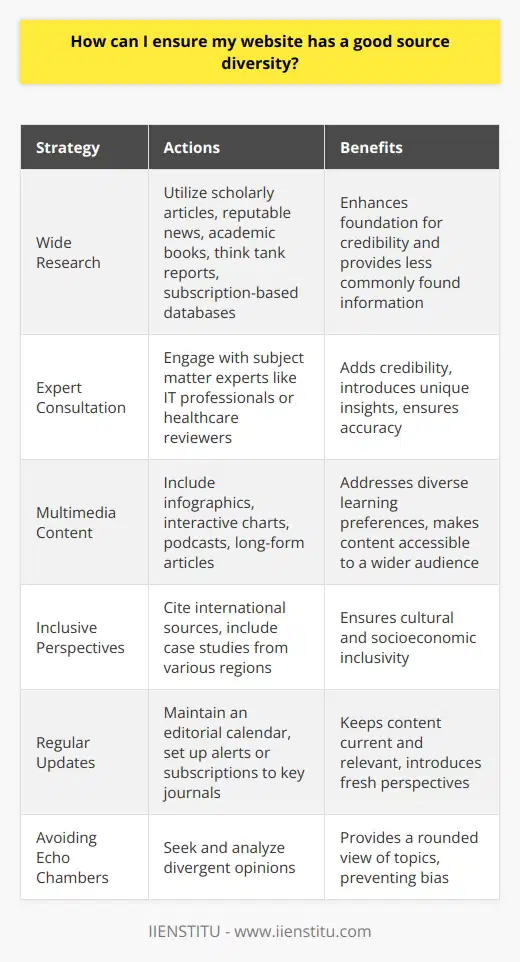
What are the potential issues with poor source diversity in SEO?
Regarding SEO (Search Engine Optimization), source diversity is critical for achieving high search engine rankings. Conversely, poor source diversity can significantly impact a website’s visibility in search engine results pages (SERPs).
One of the primary issues with poor source diversity is the risk of duplicate content. When multiple websites contain the same content, search engine algorithms may identify the content as duplicated and thus reduce the rankings of all sites involved. Another potential issue is that websites may become overly reliant on a single source of content, making them vulnerable to changes in search engine algorithms.
In addition, poor source diversity can lead to a decrease in organic search traffic. When websites get their content from the same sources, they may not be able to provide the quality and variety of content that would attract many visitors. Without a steady flow of organic search traffic, websites may struggle to build a loyal audience and increase their visibility in SERPs.
Finally, poor source diversity can create a negative user experience. Users who see the same content on multiple websites may be less likely to visit those websites or engage with their content. This can lead to lower click-through rates and fewer conversions, decreasing the website’s visibility in SERPs.
In summary, poor source diversity can have a detrimental effect on SEO. It increases the risk of duplicate content, makes websites vulnerable to changes in search engine algorithms, decreases organic search traffic, and creates a negative user experience. Therefore, businesses should strive to create diverse content sources to improve their SEO rankings.
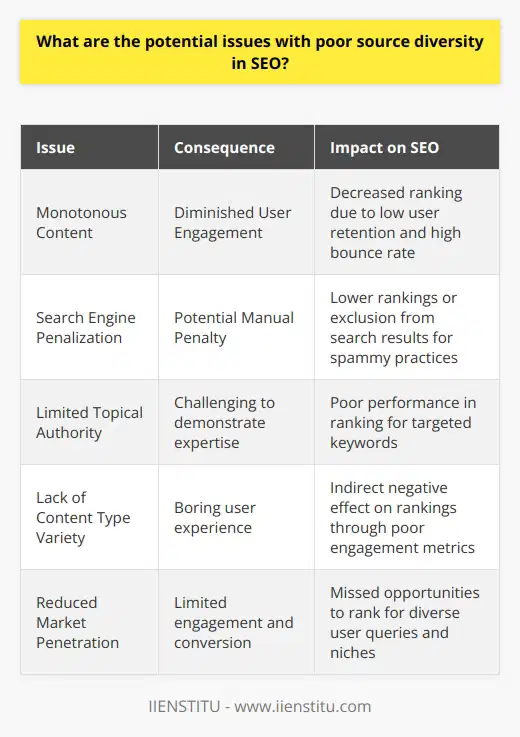
What is the role of link diversity in enhancing search engine rankings?
Role of Link Diversity
**Contributing to Higher Rankings**
In the increasingly competitive realm of search engine optimization (SEO), link diversity plays a significant role in enhancing search engine rankings for blog posts. It refers to the variety of backlinks originating from different sources, such as websites, social media platforms, and online directories.
**Building Trust and Authority**
One primary advantage of link diversity is its impact on domain authority, as search engines perceive a heterogeneous set of backlinks as evidence of a site's credibility and worthiness for higher ranking. A diverse backlink profile signals trustworthiness, indicating that the blog post is valuable enough to be linked from various reputable sources.
**Mitigating Potential Risks**
Moreover, link diversity helps mitigate risks associated with search engine algorithm updates or manipulative SEO practices, such as link farming or buying links. Should a single backlink source experience a penalty or lose its value, a diverse link portfolio ensures the blog post's overall search engine visibility remains minimally affected.
**Improving User Experience**
Furthermore, link diversity contributes to improved user experience, as it exposes the blog post to different types of users with varying preferences and browsing habits. This increased visibility results in higher referral traffic, ultimately benefitting the blog post's search engine rankings.
**Achieving Natural Growth**
Lastly, link diversity reflects a natural growth pattern for a blog post, as various sources discover and share the content over time. Search engines tend to reward such organic link-building practices, further enhancing the blog post's search engine rankings.
In conclusion, link diversity holds great importance in the realm of SEO by contributing to higher search engine rankings, building trust and authority, mitigating potential risks, improving user experience, and reflecting natural growth patterns. Thus, a strategic and well-rounded approach to acquiring diverse backlinks is paramount for any blog post's success in achieving an optimal search engine ranking.
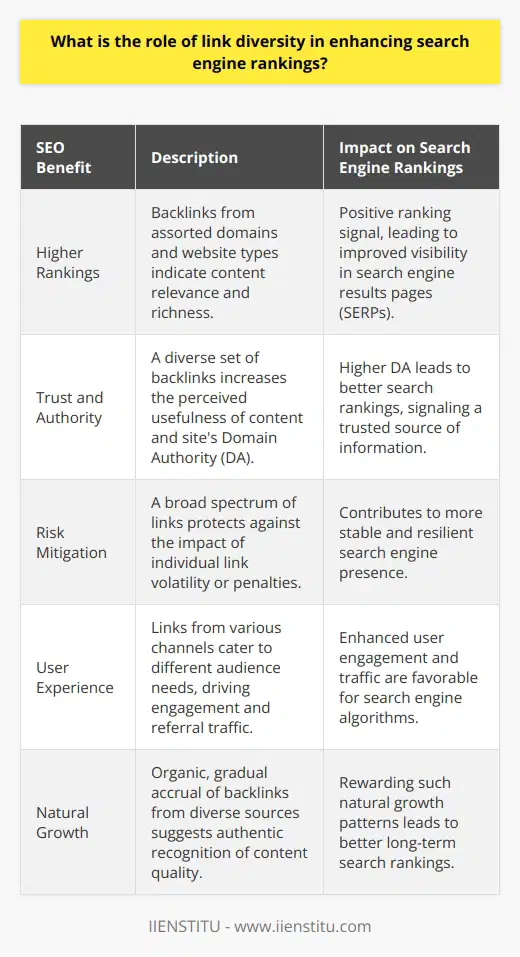
How does maintaining diversity backlinks contribute to the overall credibility of a website?
**Diversity in Backlink Sources**
Maintaining diversity in backlinks is essential for website credibility, shaping a website's online reputation in several ways. Firstly, it influences search engine rankings. Search engines, like Google, use diverse backlinks to judge a website's relevance and trustworthiness. Consequently, a website with many diverse backlinks improves its rankings, attracting more visitors.
**Contribution to Authority Building**
Diverse backlinks also help build a website's authority in its niche or area of expertise. When credible sources, such as renowned media outlets, industry blogs or social networks, link back to an article, it gains trust among readers. High-quality content backed by diverse, authoritative sources often stands out as a credible and reliable source of information.
**Influence on Public Perception**
The type and variety of sources linking back to a website generate public perception. For instance, if a blog receives backlinks from different well-respected educational institutions, it enhances its academic reputation. On the other hand, if a website obtains backlinks from low-quality sources, it may harm the website's credibility and hinder traffic growth.
**Protection from Algorithm Penalties**
Additionally, depending solely on backlinks from one source can make a website susceptible to Google's algorithm penalties. This occurs when a website acquires an unnatural amount of backlinks from one domain or follows unethical practices to build a link profile. A diverse backlink portfolio safeguards a website from penalization by search engines, ensuring long-lasting credibility.
**Augmentation of Website Visibility**
Lastly, a variety of backlinks can boost a website's visibility. When readers follow links from different platforms, they arrive at the website based on different interests and contexts. This diversity in website visitors can provide an opportunity for the website to enhance its reach and improve its content relevance for broader audience segments.
In conclusion, maintaining diversity in backlinks is vital for the overall credibility of a website, as it influences search engine rankings, contributes to authority building, shapes public perception, provides protection from algorithm penalties, and augments website visibility. A website that cultivates diverse backlinks will likely enjoy increased credibility and long-term growth.
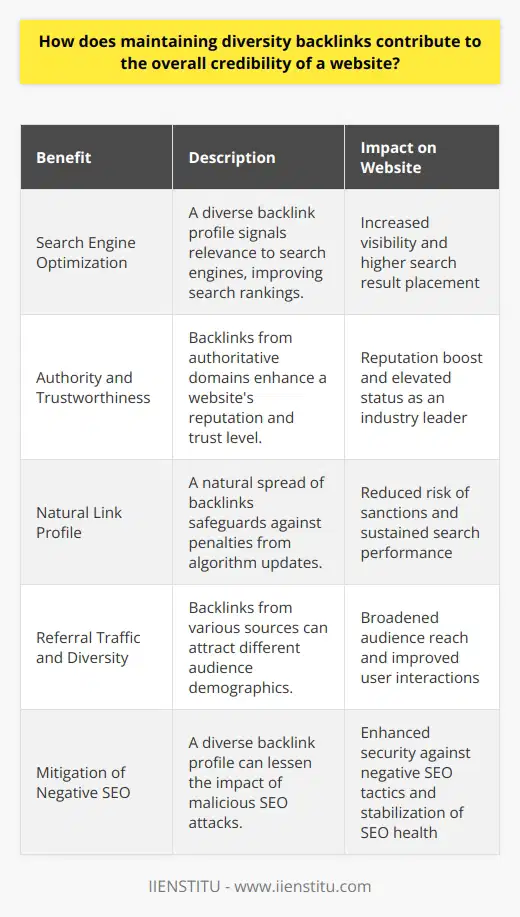
To what extent does link diversity safeguard a website against potential search engine algorithm updates?
Impact of Link Diversity on Algorithm Updates
Influence of Diverse Backlinks
Link diversity, defined as the variety of backlinks acquired by a website from different domains, holds significant importance in safeguarding a website against potential search engine algorithm updates. The primary reason behind this phenomenon is that search engines, like Google, are constantly striving to improve their ranking mechanisms to yield the most relevant results. Consequently, they make significant changes to their algorithms to discourage manipulative practices and reward high-quality websites.
Efficacy of Link Diversity
Incorporating a diverse set of backlinks strengthens a website's position in search results by reducing its dependency on a few domains, which can be subjected to future algorithm updates. It showcases the website's credibility and value to search engines, as a resourceful website would naturally generate backlinks from various credible and authoritative sources. Moreover, as search engines prioritize user experience, domains with a higher link diversity are perceived as having more engaging content, thereby promoting the website to a higher rank.
Prevention of Penalization
Websites that lack link diversity and rely mainly on a single type of backlink risk being accused of participating in spammy practices, which can lead to potential penalties from search engines. By optimizing the link profile to include diverse and high-quality backlinks, the site's vulnerability to negative impacts decreases significantly. Furthermore, by avoiding penalty-prone backlinks, websites can unburden themselves from the constant concerns of sudden ranking drops resulting from algorithm updates.
Promotion of Organic Growth
A well-balanced link profile, encompassing a wide range of different types of backlinks, not only protects the website from algorithm updates but also encourages its organic growth. This natural development of link popularity establishes the website as an authoritative and trustworthy source within its niche. As a result, search engines reward such websites with improved rankings, and users tend to associate the website with high-quality content, consequently leading to enhanced visibility and conversion rates.
In conclusion, link diversity plays a critical role in safeguarding a website against potential search engine algorithm updates by establishing a well-rounded and natural backlink profile. As search engines continue to evolve and refine their ranking algorithms, diversifying backlinks becomes an indispensable component of an effective SEO strategy, ensuring long-term stability and success of the website.
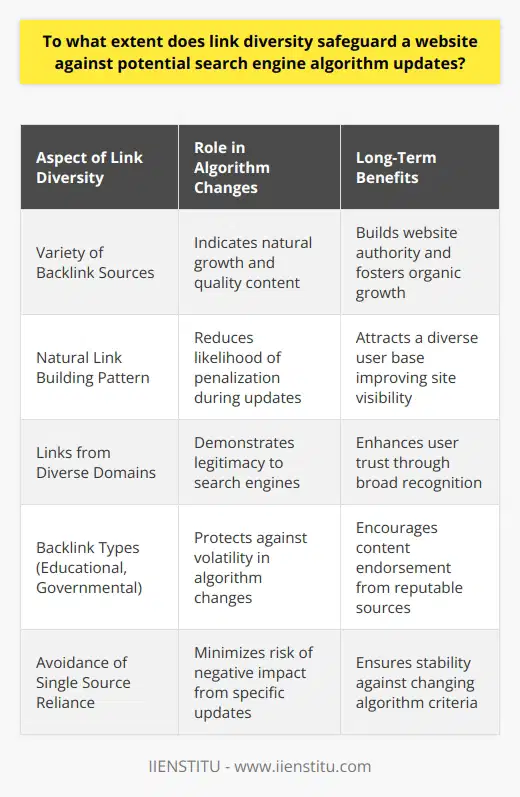
What is the correlation between SEO diversity and improved organic search results?
Correlation between SEO Diversity and Improved Organic Search Results
Role of SEO Diversity
Search engine optimization (SEO) diversity is the practice of utilizing different SEO strategies and techniques to improve the visibility of a website or blog post on search engine result pages (SERPs). This entails the use of multiple strategies, such as keyword optimization, high-quality content, backlinks, and mobile-friendliness, among others. By adopting a diversified approach, the aim is to ensure consistent and improved organic search results.
Impact on Organic Search Performance
The correlation between SEO diversity and improved organic search results can be analyzed through the effectiveness of different SEO strategies. Implementing multiple techniques can lead to more effective SEO practices and improved rankings in SERPs, thus ensuring higher organic traffic. This is mainly because search engine algorithms tend to prefer websites that apply diverse optimization tactics, as it aligns with their objective to provide users with the most relevant and useful content.
Keyword Optimization and Content Quality
Effective keyword optimization is pivotal in attracting targeted organic traffic. By employing a varied mix of high search volume keywords and long-tail phrases, a blog post can increase its chances of ranking higher in search results. Furthermore, high-quality and authoritative content positions a blog post as a credible source of information, making search engines more likely to favor the post in SERPs. A combination of keyword optimization and content quality is crucial for improved organic search results.
Backlinks and Website Structure
Establishing a diverse backlink profile with high-quality, authoritative links contributes significantly to organic search performance. Inbound links from reputable sources signal to search engine algorithms that the blog post is credible and respected, thus increasing its chances of earning a higher ranking. Additionally, a well-structured website, complete with proper navigation, internal links, and mobile-friendliness, further enhances the user experience, ultimately leading to better organic search results.
Conclusion
In summary, the correlation between SEO diversity and improved organic search results is evident across multiple aspects of optimization. A strategic combination of keyword optimization, content quality, backlinks, and website structure ensures that a blog post is equipped to perform well within search rankings. By adopting a diversified approach to SEO, website owners and content creators can increase their organic traffic in the ever-evolving digital landscape.
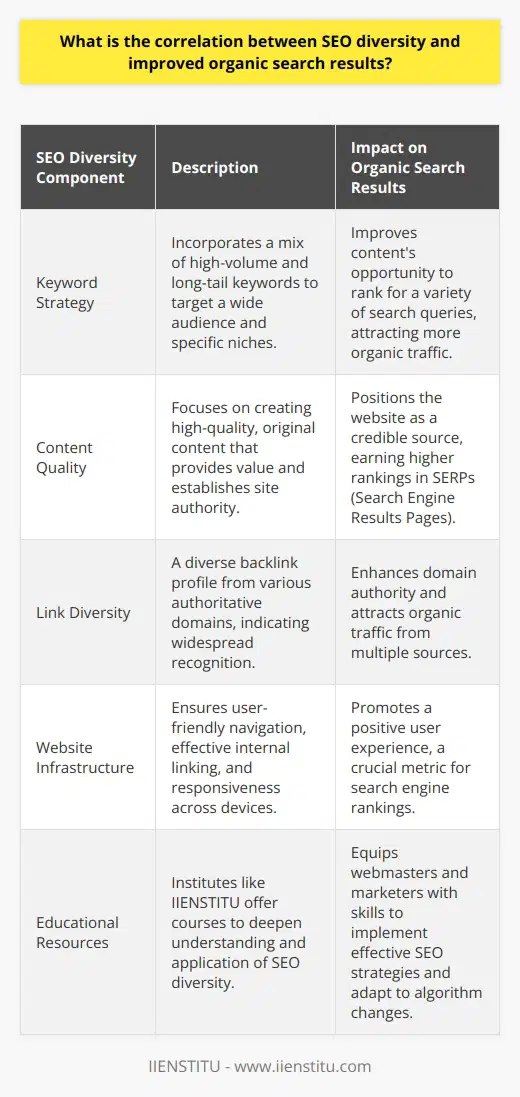
How do diversity links contribute to a balanced and natural backlink profile?
Role of Diversity Links in a Balanced and Natural Backlink Profile
Understanding Diversity Links
Diversity links are external backlinks originating from different sources that point to your blog or website. These sources include various domains, IPs, domain and page authority, and content format, among others. A diverse backlink profile directly affects search engine rankings. Consequently, website owners and bloggers need an optimal mix of backlinks to maintain a robust online presence.
Importance of Diversity in Backlinks
Search engines perceive a backlink profile with diverse link sources to signify a natural and effective linking strategy. It is vital because search engines, especially Google, use backlinks as a key parameter when determining a website's relevancy and authority. Failing to create a diverse and balanced backlink profile might result in penalties and lower search engine ranking.
Effects of Homogeneous Backlink Profiles
A homogeneous backlink profile, which features links from a limited range of sources, holds limited value for search engine ranking. Homogeneous profiles are often the result of link schemes and purchased links, which is in clear violation of search engine guidelines. Consequently, search engines penalize websites employing homogeneous backlink profiles affecting their rankings and visibility online.
Strategies for Building Diverse Backlink Profiles
Creating a diverse backlink profile should involve engaging in various strategies that not only adhere to search engine guidelines but also enrich your blog or website content.
Quality and Relevant Content: Publish high-quality, well-researched, and original content on your blog so that it attracts natural and relevant backlinks from authoritative websites.
Guest Blogging: Offer to write for industry-relevant blogs to provide valuable content, thereby generating quality backlinks.
Social Media Engagement: Share your content across different social media channels to encourage backlinks, expanding your backlink source pool.
Media Appearances and Collaborations: Seek podcasts and YouTube interviews along with industry collaborations to diversify the range of websites linking your content.
Conclusion:
In conclusion, diversity links play a crucial role in building a balanced and natural backlink profile for your blog. Incorporating various strategies like quality content, guest blogging, social media engagement, and collaborations will help achieve a diverse backlink pool. This drives better search engine ranking, thus improving your blog's overall online presence and success.
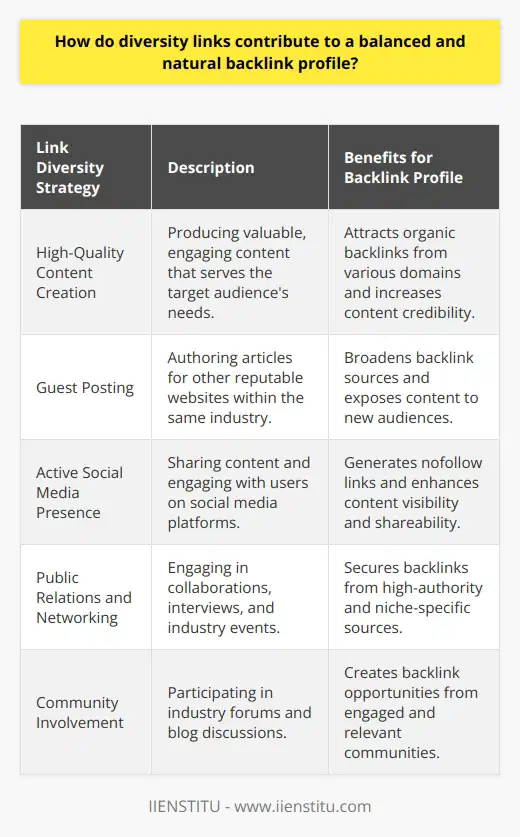
What are the best strategies to implement SEO diversity and maintain long-term search engine visibility?
**SEO Diversity Strategies**
Search engine optimization (SEO) comprises numerous strategies to improve a blog post's visibility on search engine results pages (SERPs) and drive organic traffic. Implementing diverse SEO strategies can lead to long-term SERP visibility and overall website success. Employing the following strategies promotes SEO diversity and maintains enduring search engine visibility for blog posts.
**Keyword Relevance and Variations**
Selecting relevant and diverse keywords is imperative for SEO success. It involves targeting multiple keyword phrases for a single post to capture diverse search queries. Utilize long-tail keyword phrases, as they often have lower competition and drive more conversions. Additionally, incorporating synonyms and related terms helps improve blog SEO and capture user intent more effectively.
**Quality Content Creation**
Consistently creating high-quality content is a proven strategy to maintain search engine visibility. Crafting unique, relevant, and engaging content encourages user interactions, shares, and backlinks. Well-researched and informative content also increases dwell time, a critical ranking factor for search engines. Regular updates to blog posts ensure sustained visibility, credibility, and user satisfaction.
**On-page SEO Techniques**
On-page SEO techniques optimize blog post elements to improve SERPs performance. Implement these techniques for headings, meta descriptions, permalinks, and content for maximum impact. Enhancing website loading speed, mobile responsiveness, and sitemap accessibility can also bolster results. Prioritizing user experience and providing valuable information can significantly elevate on-page SEO and improve search engine visibility.
**Link Building and Outreach**
A diversified link building strategy, encompassing internal and external backlinks, is essential for lasting SERP visibility. Acquiring high-quality backlinks from authoritative websites through guest posts, blogger outreach, and cross-promotion can improve domain authority. A well-structured internal linking plan improves website navigation, user experience, and overall SEO performance.
**Social Media Integration**
Social media integration extends the reach of blog posts and facilitates interactions with a broader audience. Sharing blog content on relevant social media platforms can increase user engagement, generate traffic, and improve search engine visibility. Engaging on social media platforms and using sharing tools and plugins act as social signals that benefit SEO performance.
In conclusion, implementing a diverse range of SEO strategies, such as relevant keyword targeting, quality content creation, on-page SEO techniques, diversified link building, and social media integration, is crucial for maintaining long-term search engine visibility. These strategies foster sustainable growth and ensure that blog posts achieve their full potential in driving organic traffic, user engagement, and conversions.

What are the key factors to consider when optimizing for diversity in SEO?
Understanding Audience Diversity
The key to any successful SEO strategy begins with understanding your audience. Diversification in SEO is crucial because different audience segments may use distinct search terms. Make sure to conduct thorough audience research, which includes demographics, behaviors, and language preferences.
Diversified Content Strategy
Another vital factor involves adopting a diversified content strategy. Consider different content types to appeal to a broader audience. News articles, blog posts, videos, infographics and podcasts can all improve visibility in search engines.
Utilization of Multiple Channels
Diversity on multiple channels can significantly enhance SEO performance. Social media platforms, YouTube channels, podcasts and blogs can target varied audiences, enhancing your overall reach.
Keyword Diversity
Optimize your content around a diverse array of keywords to echo the diverse interests of your target audience. Long-tail keywords in particular can connect you to niche segments.
Interlinking and backlinking
Interlinking within your website and backlinking from other sites can enhance exposure. A diverse profile of quality backlinks can improve your site's authority and overall SEO ranking.
Multilingual and International SEO
Finally, consider multilingual and international SEO if your brand serves a global audience. This approach means optimizing your website to appear in search results across different regions and languages.
In conclusion, understanding your audience, diversifying content, multi-channel use, keyword diversity, interlinking/backlinking techniques, and international SEO form the foundation of optimizing for diversity in SEO. These factors can help drive overall visibility and engagement, ensuring that your site resonates with a broad and diverse audience.
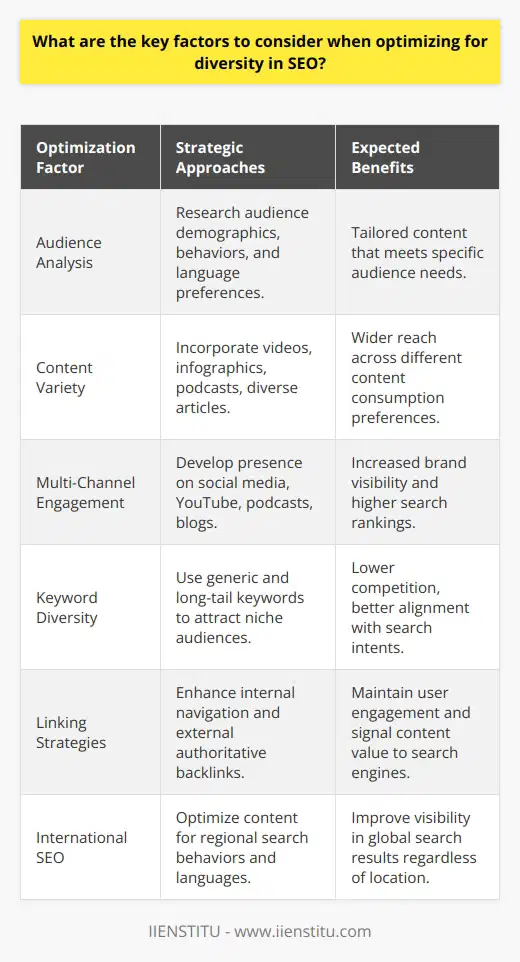
How does diversification of anchor text support a more robust link building strategy?
Link Building Strategy and Diversified Anchor Text
Effective link building strategy lies in diversified anchor text usage. Anchor text refers to the clickable words used to hyperlink. When se diversified, it boosts your blog's SEO rankings. Anchor text diversification promotes a well-rounded backlink profile, fostering organic visibility.
Effective User Engagement
Utilizing diverse anchor texts piques users' interest. It also enriches overall user experience by making your blog more engaging and easy-to-navigate. This, in turn, amplifies the click-through rate and boosts the website's visibility on search engines.
Enhancing Site Relevance
Diversification of anchor text supports relevancy. Using diverse, context-related anchor texts makes your blog more relevant to various search queries. This broadens your audience reach, making your content accessible to more users.
Avoiding Algorithm Penalties
Search engines discourage over-optimized anchor texts. Varying anchor text reduces suspicion of manipulation and helps avoid Google's algorithmic penalties. Diversified anchor texts present an organic link profile, highly favored by search engines.
Conclusion: Balanced Anchor Text Strategy
Overall, balanced use of exact-match, branded, and generic anchor texts usually entails a robust link building strategy. Besides enhancing SEO, diversified anchor texts improve user experience and increase organic visibility. Hence, diversifying anchor text is integral to a potent link-building strategy.
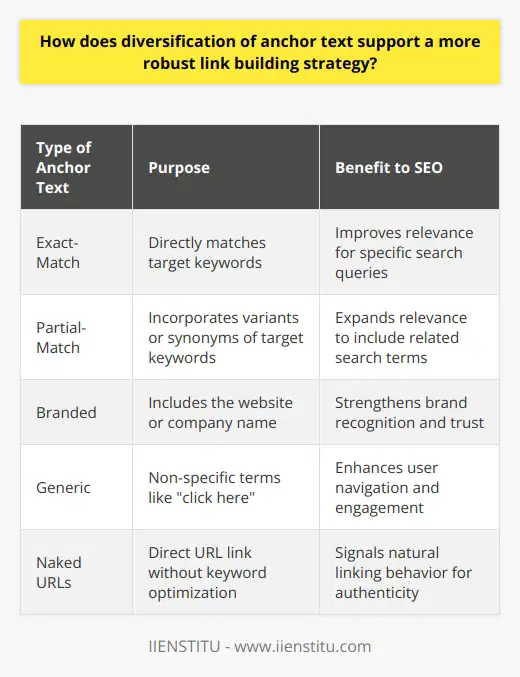
In what ways can incorporating various types of content formats contribute to enhancing SEO diversity?
Incorporating Diverse Content Formats
Utilising various content formats in blog posts can ramp up SEO diversity in a multitude of ways. The first is the introduction of multimedia, such as audio and video. Often embedded with textual descriptions and transcripts, these materials boost SEO through multiple searchable texts. Moreover, these formats appeal to diverse user preferences, subsequently increasing the engagement and site dwell time, all essential indicators for search engine rankings.
Inclusion of Infographics
Further, the use of infographics brings about another worthwhile opportunity. By naturally inciting link-backs and shares, infographics broaden a site’s link profile, a significant factor in SEO. Moreover, presenting information dynamically also enhances user experience, leading to better bounce rates.
Leveraging Structured Data
Additionally, structured data, like Schema markups, can tremendously aid in SEO. By allowing search engines to better comprehend a webpage's content, these markups indirectly influence rankings. They also help secure rich snippets in search results, thereby improving click-through rates.
Advantages of Long-Form Content
In the same vein, incorporating long-form content works well with SEO diversity. With more room for comprehensive information, keyword integration, and linkable content, long articles have shown to garner strong SEO benefits, including higher search visibility.
Embedding User-Generated Content
Lastly, the inclusion of user-generated content, such as reviews and comments, enhances SEO. This natural form of content is a goldmine for unique, long-tail keywords that might have been missed in the main content.
In summary, varying content formats achieve multiple SEO benefits, including increased search visibility, enhanced user engagement, and diversified link profiles. Each format indirectly supports search engine rankings by offering unique, high-quality, and searchable content. Therefore, adopting a multi-format content strategy is integral for maximizing SEO diversity.
